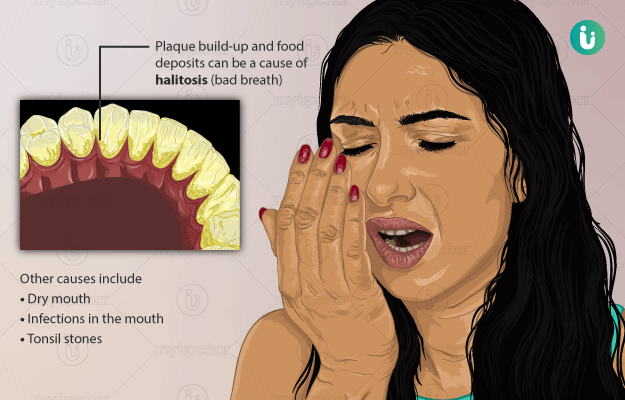Summary
Bad breath is characterised as a prominent unpleasant odour from mouth exhaled during breathing. In medical terminology bad is breath is referred to as Halitosis or Oral Malodor. Unpleasant odour from the body regardless of its sources (mouth or body) is also known as halitosis. But oral malodor especially describes bad breath from the mouth. Researchers believe that Bad breath affects large populations globally. It is often ignored and people suffering from bad breath face significant psychological and social handicap. The most common reason for bad breath are microorganisms such as gingival which usually form a coat in our gums and tongue. Good news is a good oral hygiene and certain prescribed medicines from a doctor usually help in recovering from oral malodor completely.
Did you know?
Chronic bad breath is a serious condition affecting approximately 25% of the world's population. Men and women suffer from bad breathe in equal proportions but studies suggest that women seek faster help and treatment than men. Doctors claim that bad breath is often curable requiring minimal medical interventions. However unpleasant odour and bad breath can be caused due to certain underlying medical conditions also. Hence Don't ignore it, please consult a doctor preferably a dentist or ENT specialist if you have a persistent bad breath for more than 15 days. (Consult a doctor with Doctor app)

 Doctors for Bad Breath
Doctors for Bad Breath  OTC Medicines for Bad Breath
OTC Medicines for Bad Breath
 Bad Breath articles
Bad Breath articles
 Ayurvedic Treatment of Bad Breath
Ayurvedic Treatment of Bad Breath
 First Aid for Bad Breath
First Aid for Bad Breath
 Home Remedies for Bad Breath
Home Remedies for Bad Breath
 Homeopathic Treatment of Bad Breath
Homeopathic Treatment of Bad Breath
























 Editorial Team
Editorial Team

 Dr. Rachita Narsaria
Dr. Rachita Narsaria

 Dr. Laxmidutta Shukla
Dr. Laxmidutta Shukla











